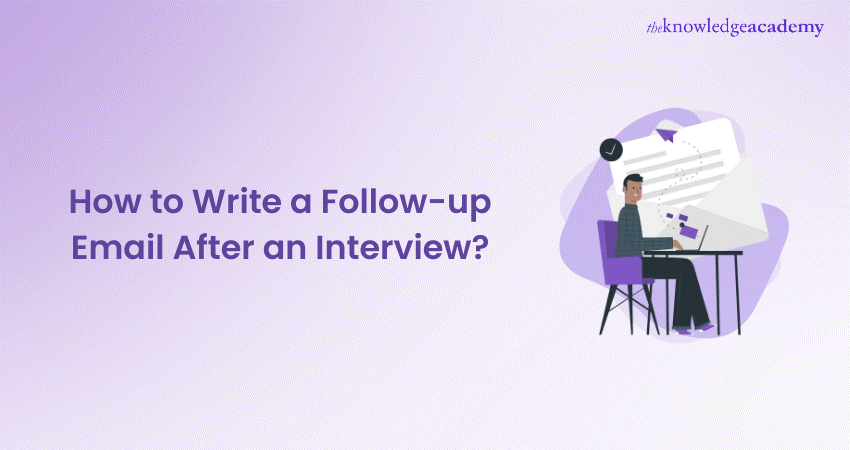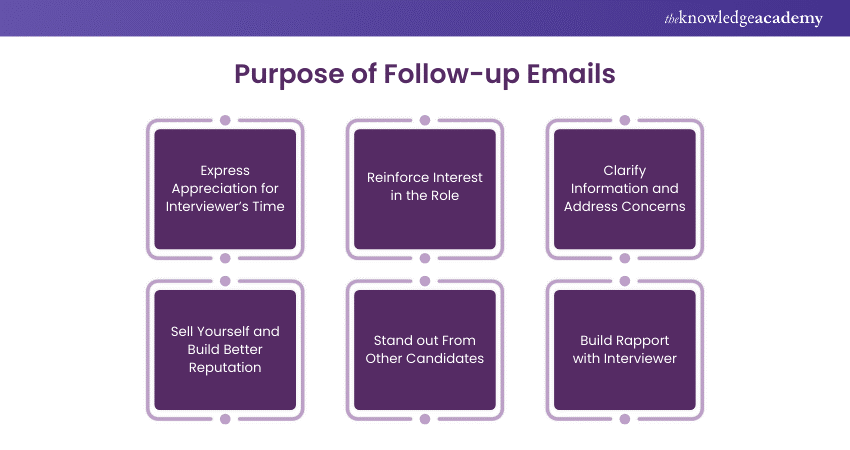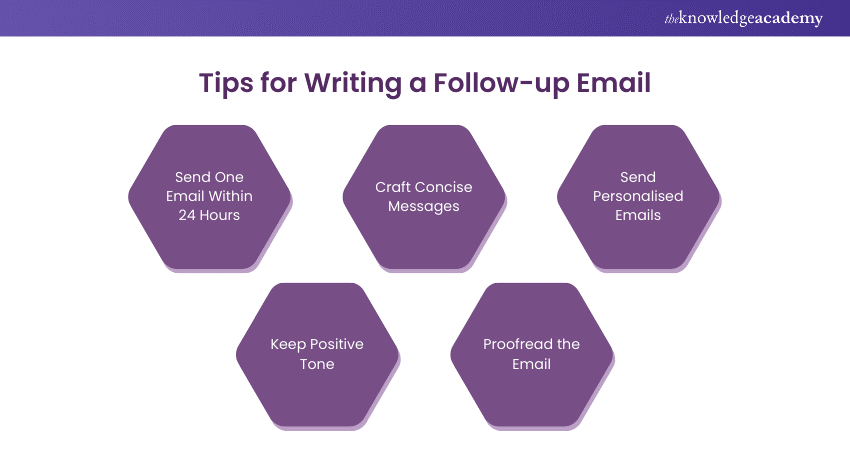We may not have the course you’re looking for. If you enquire or give us a call on 01344203999 and speak to our training experts, we may still be able to help with your training requirements.
We ensure quality, budget-alignment, and timely delivery by our expert instructors.

We all have heard of cold mails. But what exactly is follow-up emails? Follow up Emails are mails that convey your responsibility and concern towards the job application. This reminds the recipient of your previous communication and keeps the conversation going. This follow-up email demonstrates your courtesy and etiquette while leave a lasting impression and spotlight why you’re the right fit for the job!
The blog will take you through the essential steps of writing the perfect Follow-up Email After Interview that keeps you top-of-mind with employers and tips the scale in your favour. So read on and shine in your next interview!
Table of Contents
1) What is a Follow-Up Email After an Interview?
2) Why is it Important to Send a Follow-Up Email After an Interview?
3) How to Write a Follow-up Email?
4) When Is the Best Time to Send a Follow-Up Email After an Interview?
5) Tips for Writing a Follow-up Email
6) Example of a Follow-up Email After Attending an Interview
7) Conclusion
What is a Follow-Up Email After an Interview?
Follow-up emails are the messages that candidates send to an interviewer following a job interview. These emails are sent to monitor the status of the job application. After an interview, it's important to follow up with your interviewer to create a positive impression. Learning what to include in the follow-up email and when to send it can spotlight your professionalism and increase your chances of securing the job.
Why is it Important to Send a Follow-Up Email After an Interview?
Sending a follow-up email after an interview is crucial because it not only allows you to check on your application status but also:
1) Express appreciation for the interviewer’s time
2) Reinforce your qualifications and your interest in the role
3) Clarify information and address concerns that came up during the interview
4) Stand out from the other candidates and build rapport with the interviewer

So essentially, following up on your interview with a thank you email puts you ahead of more than half of the competition.
How to Write a Follow-up Email?
A follow-up mail highlights to the interviewer and prospective employer that you are passionate about the job position. Here are six steps to write a follow-up email to grab the interviewer’s interest
1) Select the Appropriate Subject Line
A subject line is quite possibly the most vital element of a follow-up email because it offers a glimpse of what to expect from the body of the email. Make sure the subject line conveys the intended message clearly and concisely. Focus on including the name, position, and date.
Here are some examples of good subject lines:
a) Thank you for your time, [Interviewer or hiring manager's name]
b) Questions about [job title]
c) Seeking clarification regarding the interview process
d) Thank you for the opportunity
e) It was great interacting with you!
2) Start With a Polite Greeting
Begin your professional message with salutations like 'Dear Mr.', 'Dear Ms', or 'Ms./Mr. [Name]' followed by the position, industry and brand voice. Using the proper salutation and name enables you to build an immediate connection. Common examples include:
a) Good morning, [Last name of hiring manager]
b) Dear Mr. [Last name of hiring manager]
c) Greetings Madam
3) Express Gratitude to the Interviewer
Start the email by mentioning the job position you applied for, thanking the employer for their time, and expressing interest in the company and the job. Giving details about the role helps them recall the exact details. If possible, mention a memorable portion of the interview and get as specific as possible while keeping it short and concise.
Since an interviewer might interview multiple candidates, you can also include the date and location of the interview. An example would be: Thank you for discussing the content writing role on [Date]. It was a pleasure talking to you about it, and I appreciate your time.
Looking to hone effective resume writing and cover letter writing skills? Our detailed Job Search Course will guide you - Sign up now!
4) Reiterate the Value You Bring
Use the email follow-up to show interest and spotlight why you are a suitable candidate for the job. You must mention some relevant skills discussed during the interview and that you plan to use them for the role. Be confident, persuasive, and humble when reminding the hiring manager about the value you bring.
Example: I strongly believe that my six years of Content Writing and proofreading experience makes me a good fit for the senior content writer's role because I can craft content that resonates with the target audience.
5) Highlight What Sets You Apart From Other Candidates
The last paragraph should focus on your summary statement about how you stand out from the other applicants. This paragraph must invite potential employers to ask further questions, and the email must end with a Call To Action (CTA) inviting hiring managers to contact you.
Here’s an example: ‘I am confident that my background in writing and proofreading can help me fulfil the job requirements and support the company's vision. Please contact me if you need more samples of my work. I look forward to hearing from you.’
6) Include Your Signature and Contact Details
You must close your follow-up email by adding your signature and contact information. Focus on including your alternative email address, home phone number and home address. Also, select a friendly and professional closing, such as 'Thank you' or 'Yours Sincerely'. An example would be:
Thank you,
[Candidate Name]
[Phone No.]
[Email Address]
When Is the Best Time to Send a Follow-Up Email After an Interview?
You must send at least one follow-up email within 24 hours of the interview in which you express your appreciation for the interviewers’ time, thank them for the opportunity, and reinforce your interest. Additionally, you must send a follow-up email if the agreed-upon deadline for the hiring decision has passed, and you haven’t heard back. Consider the following timeframes for sending a follow-up email after the interview:
1) Within 24 Hours: This timeframe is suitable if you feel the job is a good fit and want to convey appreciation for the interviewer’s time. You can also reiterate your interest by mentioning something particular you discussed in the interview.
2) Two to Three Days: This timeframe is ideal for expressing your appreciation and leaving a stronger impression. However, emailing the interviewer twice within a week can make you seem too pushy.
3) One Week: This is a gentle reminder that you’re still interested in the job position.
4) Two Weeks: This timeframe is perfect if you are seeking an update on the hiring process and your job application. Additionally, you could request a date for the next steps of the decision-making process.
5) Three to Four Weeks: This is for seeking a response on whether you made the cut. At this point, you can expect that they are close to finalising a decision or have decided but haven’t found the time to get back to you. In this case, you can put a subject line such as ‘Requesting updates on the [Job Title] position job interview’.
6) After One Month: In this timeframe, simply send an upfront reminder with a subject line such as ‘Is the [Job Title] position at [Company Name] still available?’ and move on to other interviews.
If you decide to send it before the one-week mark, it must be a short message to thank the interviewer for their time.
Learn expert tips and techniques to boost self-motivation in our Motivation and Goal Setting Training - Register now!
Tips for Writing a Follow-up Email
The following tips will help you write and send effective follow-up emails:

1) Send the Follow-up Email Quickly: Speed is essential when sending a follow-up email. This is vital especially when you want to add something new to your previous conversation.
2) Keep it Short: Hiring managers are usually busy, so prioritise concise messages. Express your thoughts as clearly as possible so the recipient knows why the email was sent.
3) Send Personalised Emails: Creating a personalised email for each interviewer can secure a positive first impression. You can mention something specific that the interviewer talked about during the face-to-face discussion.
4) Keep it Positive: It is essential to stay positive during a professional interaction. Use language that showcases your eagerness for the opportunity.
5) Proofread the Write-up: Sending an email with noticeable grammatical errors can reduce your chances of capturing employers' attention. So, before emailing, thoroughly proofread the email.
Example of a Follow-up Email After Attending an Interview
The following two examples outlines the necessary elements of an ideal follow-up emails:
Example 1: Follow-up email after attending an interview for the role of IT Manager
|
Subject: Thank You for the Opportunity – IT Manager Interview Dear [Interviewer’s Name], I hope this message finds you well. I am grateful for the opportunity to be interviewed for the IT Manager position at [Company Name]. It was a pleasure speaking with you and your team about the role and learning about the exciting projects ahead. Our discussion reinforced my interest in the position, especially with [specific point discussed during the interview, such as cloud integration and data security]. I’m enthusiastic about contributing my expertise in [Relevant skills, such as IT infrastructure optimisation and Network Management] to help [Company Name] achieve its goals. Please don’t hesitate to contact me if you need any additional information. Thank you once again for your time and consideration. Best regards, [Your Full Name] [Your Contact Information] |
Example 2: Follow-up email after attending an interview for the role of senior Content Writer
|
Subject: Thank You for the Phone Interview – Senior Content Writer Position Dear [Interviewer’s Name], I want to thank you for yesterday's insightful phone interview concerning the Senior Content Writer position at [Company Name]. It was a pleasure discussing my experiences and skills and how they align with your team’s diverse content goals. I am particularly excited about [Something specific discussed during the interview, such as ‘Opportunity to lead social media content strategy for your upcoming product launches’]. I’m confident that my background in [Relevant skill such as SEO-oriented content creation] can contribute to [Company Name]'s ongoing and future success. Please let me know if you need any further details from my side. I look forward to hearing about the next steps in the hiring process. Thank you again for your time and consideration. Best regards, [Your Full Name] [Your Contact Information] [Your Email Address] [LinkedIn Profile or Portfolio Link] |
Conclusion
In conclusion, a well-crafted, thoughtful Follow-up Email After Interview can significantly elevate your chances of impressing the interviewers and tipping the scale in your favour. Whether you follow up in three days or within three to four weeks, the email will keep the conversation alive and remind the hiring team why you’re right for the job. The steps and tips outlined in this blog will help you impress the prospective employers and strengthen your prospects.
Looking for guidance in better job search techniques? Our comprehensive Getting Back Into Work Course will help you out – Sign up now!
Frequently Asked Questions
How to Follow up on an Interview After no Response?

If you don’t receive any response after an interview, you can write a follow-up email to the interviewer or interview scheduler. In the email, you must greet them by their first name and remind them of the job position you interviewed for. Also mention the interview date and stress your interest in the position.
What if the Interviewer Didn't Provide Contact Information for a Follow-up?

In case you don't have the interviewer's contact info, send a thank you note to the person who scheduled your interview (That could include secretary, assistant, or HR representative). Additionally, you can look up the interviewer's name on LinkedIn or the company website.
What are the Other Resources and Offers Provided by The Knowledge Academy?

The Knowledge Academy takes global learning to new heights, offering over 3,000 online courses across 490+ locations in 190+ countries. This expansive reach ensures accessibility and convenience for learners worldwide.
Alongside our diverse Online Course Catalogue, encompassing 19 major categories, we go the extra mile by providing a plethora of free educational Online Resources like News updates, Blogs, videos, webinars, and interview questions. Tailoring learning experiences further, professionals can maximise value with customisable Course Bundles of TKA.
What is The Knowledge Pass, and How Does it Work?

The Knowledge Academy’s Knowledge Pass, a prepaid voucher, adds another layer of flexibility, allowing course bookings over a 12-month period. Join us on a journey where education knows no bounds.
What are the Related Courses and Blogs Provided by The Knowledge Academy?

The Knowledge Academy offers various Personal Development Courses, including the Managing Difficult Conversations Course and the Interview Skills Course. These courses cater to different skill levels, providing comprehensive insights into Including Career Break in Resume.
Our Business Skills Blogs cover a range of topics related to interviews, offering valuable resources, best practices, and industry insights. If you are looking to advance your chances at succeeding in the next interview, The Knowledge Academy's diverse courses and informative blogs have got you covered.
Upcoming Digital Marketing Resources Batches & Dates
Date
 Interview Skills Training
Interview Skills Training
Fri 21st Mar 2025
Fri 16th May 2025
Fri 18th Jul 2025
Fri 19th Sep 2025
Fri 21st Nov 2025






 Top Rated Course
Top Rated Course



 If you wish to make any changes to your course, please
If you wish to make any changes to your course, please


